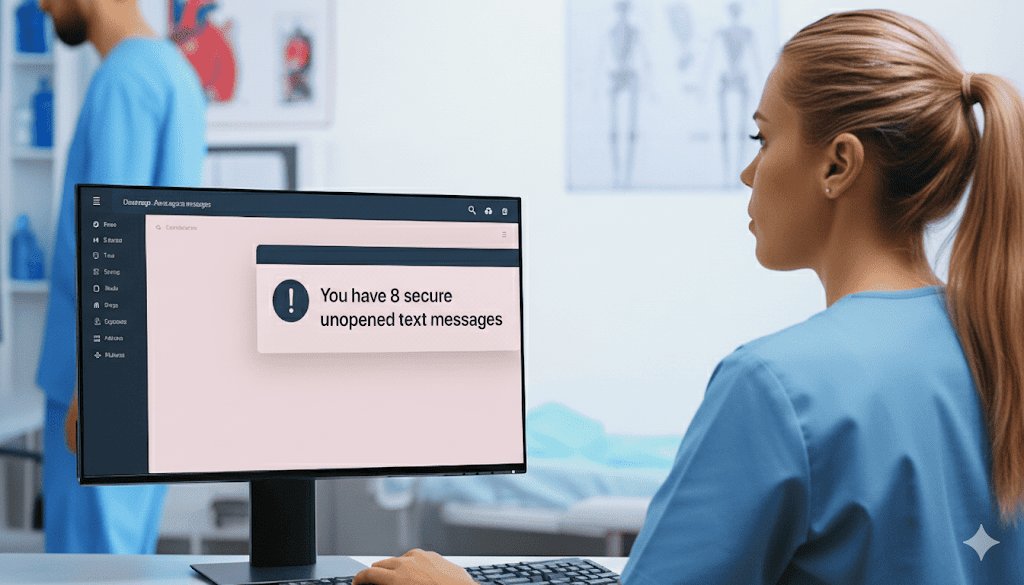HIPAA-Compliant Texting for Tebra Users: A Complete Guide
💡HIPAA-compliant texting for Tebra allows practitioners to transform their clinic. This enables them to send secure, encrypted patient...
7 min read
Gregory Vic Dela Cruz : October 16, 2025

Athenahealth clinics use HIPAA-compliant texting to improve their operational efficiency. They instantly reduce no-shows, shorten wait times, and improve the patient experience. Safeguards including encryption, audit trails, and BAAs keep communication compliant.
Text messaging has become the go-to communication tool for both patients and providers. It’s fast, convenient, and effective—but in healthcare, not all texting is created equal. To meet HIPAA rules, clinics need secure SMS that ensures patient data stays private. That’s where HIPAA-compliant texting workflows come in.
Texting workflows allow Athenahealth clinics to automate everyday communication tasks. This can range from reminders to follow-ups, while maintaining full compliance. Instead of ad hoc texting from staff phones, these systems integrate with Athenahealth. Thus, they keep every message encrypted, logged, and auditable.
The result? Smoother patient engagement and safer, more reliable communication. Let’s explore how structured workflows transform text messaging for Athenahealth clinics.
In our complete guide to HIPAA-compliant texting for Athenahealth users, we covered the incredible value that secure SMS provides to modern clinics. But it takes actionable processes to see this tool in action. Here are a few reasons why texting workflows matter.
When staff members send messages from personal phones, it creates security gaps, inconsistent messaging, and compliance risks. Ad hoc texting lacks encryption, audit logs, and consent tracking—all required under HIPAA texting rules in healthcare. Structured workflows within Athenahealth prevent these risks by standardizing every communication through secure, approved channels.
HIPAA-compliant texting workflows give Athenahealth users consistency. Whether sending reminders, instructions, or follow-ups, messages are automatically templated, timestamped, and logged. This ensures no protected health information is sent insecurely or forgotten. Workflows also help clinics maintain accurate records for audits and compliance reviews, ensuring all activity aligns with HIPAA and organizational standards.
Automation is the key to scalability. Instead of manually texting patients, Athenahealth clinics can trigger secure messages based on appointment status, visit type, or provider. This automation ensures that hundreds of patients can receive the right messages at the right time, without staff intervention. HIPAA texting solutions for EMRs like Athenahealth reduce workload while maintaining patient trust and legal compliance.
Automated appointment reminders sent via secure texting reduce no-shows by 25–30%. These messages sync with Athenahealth scheduling, delivering personalized reminders 24–48 hours before visits. Patients can confirm or reschedule directly from the message, improving scheduling efficiency and satisfaction.
Clinics use HIPAA-compliant texting workflows to send secure links to online patient forms and pre-visit instructions. Patients can upload IDs and insurance cards before arrival, streamlining check-ins. Integrating digital intake with patient texting Athenahealth integration eliminates paperwork and shortens front desk processing time.
After visits, Athenahealth users can send automated follow-up messages for medication reminders, post-op care, or chronic condition monitoring. For example, a patient managing hypertension can submit blood pressure readings through a secure message, allowing providers to track progress without unnecessary office visits.
HIPAA-compliant texting isn’t just for care—it’s also for growth. Clinics can automatically send review requests after visits while filtering out negative feedback for internal handling. This improves online reputation and builds trust through consistent patient engagement.
HIPAA-compliant communication Athenahealth workflows can include automated after-hours responses that inform patients when staff will reply or direct them to emergency resources if needed. This ensures patients feel acknowledged while keeping clinics compliant and protected from privacy risks.
Encryption is the backbone of secure texting apps for healthcare. Every message sent through Athenahealth-integrated platforms must be encrypted both in transit and at rest. This ensures that even if data is intercepted, it cannot be read or altered. Providers can confidently communicate with patients without compromising PHI security.
HIPAA requires that any third-party service handling patient data sign a Business Associate Agreement. BAAs legally bind vendors to safeguard PHI and define accountability in case of breaches. Athenahealth users implementing HIPAA-compliant texting workflows must ensure their vendor provides a signed BAA to maintain compliance and legal protection.
Audit trails track every message sent, received, or deleted within the system. This feature provides full transparency, ensuring compliance teams can review communication logs at any time. If a dispute arises, these trails serve as evidence of secure and appropriate patient communication, strengthening the clinic’s compliance posture.
Only authorized staff should have access to messaging systems. HIPAA-compliant texting for Athenahealth users includes multi-factor authentication and user role permissions. Each message is associated with the sender, ensuring accountability and preventing unauthorized access to sensitive information.
To further protect PHI, messages may automatically expire after a set time or move to secure archives. This prevents old data from being stored indefinitely or accessed outside authorized channels. Athenahealth integrations can align retention policies with HIPAA’s minimum necessary standard, ensuring compliance without overexposure.

Thanks to seamless integration with Athenahealth, automated reminders keep patients accountable and informed. Clinics that implement HIPAA-compliant texting workflows Athenahealth models often see a 25% drop in no-shows and fewer last-minute cancellations.
By sending digital forms and pre-visit instructions ahead of time, staff can process patients faster upon arrival. Secure texting in healthcare makes it easy for patients to complete forms remotely, helping clinics start appointments on time and improve patient flow.
Patients appreciate timely communication, especially when it’s convenient and respectful of their privacy. HIPAA-compliant texting enhances trust and accessibility, keeping patients engaged and loyal to their provider.
Replacing manual calls and paperwork with automated texting saves hours per day. Athenahealth clinics using HIPAA texting solutions for EMRs report significant efficiency gains, allowing staff to focus more on patient care rather than administrative tasks.
A multi-specialty healthcare group with six locations struggled with manual appointment reminders and front desk delays caused by paper intake forms. Before implementing HIPAA-compliant texting workflows, staff spent hours daily calling patients to confirm appointments and scanning forms into Athenahealth.
Missed calls often went unanswered, contributing to a persistent 22% no-show rate and patient frustration due to long check-in times. The group needed a scalable, compliant communication method that could unify operations across departments—ranging from pediatrics to internal medicine.
After adopting a HIPAA-compliant texting integration with Athenahealth, the group automated appointment reminders and replaced paper forms with secure digital intake links. Patients began receiving personalized reminder texts 48 hours before visits, with options to confirm or reschedule instantly. Intake links allowed patients to upload insurance cards and complete forms from home, reducing check-in times by 45%.
Within four months, the group’s no-show rate dropped to 11%, and staff reported saving an average of 10 hours per week on administrative tasks. Most importantly, patients praised the convenience and transparency of secure text-based communication, resulting in a 20% increase in satisfaction scores on post-visit surveys.
An independent imaging center serving over 300 patients per week faced compliance risks and inefficiencies from collecting patient identification and insurance data at the front desk. Staff frequently handled sensitive documents manually, scanning cards and verifying details on-site, which caused bottlenecks and increased the chance of errors or privacy breaches.
In addition, delays in insurance verification led to appointment rescheduling, creating patient dissatisfaction and lost revenue opportunities. The leadership team needed a compliant digital alternative that would improve workflow and enhance patient security.
The center implemented HIPAA-compliant secure texting integrated with Athenahealth to request ID and insurance uploads before appointments. Patients received automated messages three days prior to their visit, prompting them to upload photos through a secure, encrypted link. The workflow automatically stored these documents in the patient’s Athenahealth record, enabling staff to verify insurance details in advance.
As a result, check-in times decreased by 35%, and administrative scanning tasks were eliminated entirely. The clinic also passed its subsequent HIPAA audit with zero findings, citing the secure messaging workflow as a best practice for compliance. Beyond efficiency, the imaging center’s team noted improved patient trust and appreciation for the new privacy-conscious process, as feedback forms highlighted “ease of check-in” as one of the top improvements in overall experience.
A mid-sized primary care practice wanted to improve its online visibility and reputation but struggled to gather consistent feedback from patients. Despite providing high-quality care, the practice averaged only two new Google reviews per month. The front desk occasionally handed out printed feedback forms, but participation remained low due to time constraints and patient forgetfulness.
The practice also wanted to ensure any feedback collection complied with HIPAA guidelines and avoided sharing sensitive information publicly. Leadership sought a digital method that would automate review requests while maintaining privacy and professionalism.
After integrating HIPAA-compliant texting with Athenahealth, the practice implemented an automated post-visit workflow. Once a patient checked out, the system sent a personalized thank-you text within two hours, followed by a secure link directing them to leave a review on Google. Negative feedback was filtered internally through a private response link, allowing staff to address concerns before they appeared online.
Within three months, the clinic’s average number of monthly reviews jumped from two to forty-eight, and its overall star rating increased from 4.0 to 4.8. The practice also identified several operational improvements based on patient feedback, such as adjusting front desk staffing during peak hours. The success of this workflow proved that compliant, automated reputation management can drive both patient engagement and measurable growth—without compromising data security.
These case studies illustrate how HIPAA-compliant texting workflows in Athenahealth transform both patient experience and clinic efficiency. Whether streamlining reminders, enabling secure uploads, or boosting online reputation, each example shows that automation and compliance can go hand in hand.
HIPAA-compliant texting workflows for Athenahealth are no longer optional. They’re essential for modern healthcare communication. For Athenahealth users, secure text messaging provides an efficient, scalable, and compliant solution.
By using workflows for reminders, intake, and follow-ups, your clinic gains an edge. You can improve operational efficiency, reduce no-shows, and elevate the patient experience. Automation not only simplifies communication but also ensures it aligns with privacy regulations.
With Curogram’s HIPAA-compliant texting integration, you can achieve secure and personalized communication. Ready to see how it works? Get a quick demo today.

💡HIPAA-compliant texting for Tebra allows practitioners to transform their clinic. This enables them to send secure, encrypted patient...

💡 HIPAA-compliant texting workflows for Tebra users help clinics communicate securely and efficiently. Instead of ad hoc texting, workflows ensure...

💡 NextGen clinics can improve their patient communication with secure text messaging. It comes down to secure, compliant, and efficient workflows....